Feminism and Girls’ Rights in Education: A Review of Developing Cases
VerifiedAdded on 2023/04/25
|28
|8115
|297
Literature Review
AI Summary
This literature review explores the concept of feminism and its impact on girls' right to education, focusing on cases from developing countries like Pakistan and Nigeria. It begins by defining feminism as a movement for equal political, personal, economic, and social rights for women, highlighting both progress and persistent inequalities. The review discusses the historical context of feminism in Pakistan, noting the influence of religious extremism and patriarchal traditions, while also acknowledging the achievements of prominent Pakistani women. Similarly, it examines the evolution of feminism in Nigeria, from early movements to contemporary expressions, emphasizing the role of technology and social media in raising awareness. The review further delves into the importance of education for girls' empowerment, referencing the Universal Declaration of Human Rights and analyzing the challenges faced by girls in accessing education in Pakistan and Nigeria, including cultural barriers, security concerns, and the impact of extremist groups like the Taliban and Boko Haram. The review concludes by highlighting the ongoing efforts to promote girls' education and gender equality in these regions, including the work of activists like Malala Yousafzai and the role of international organizations.
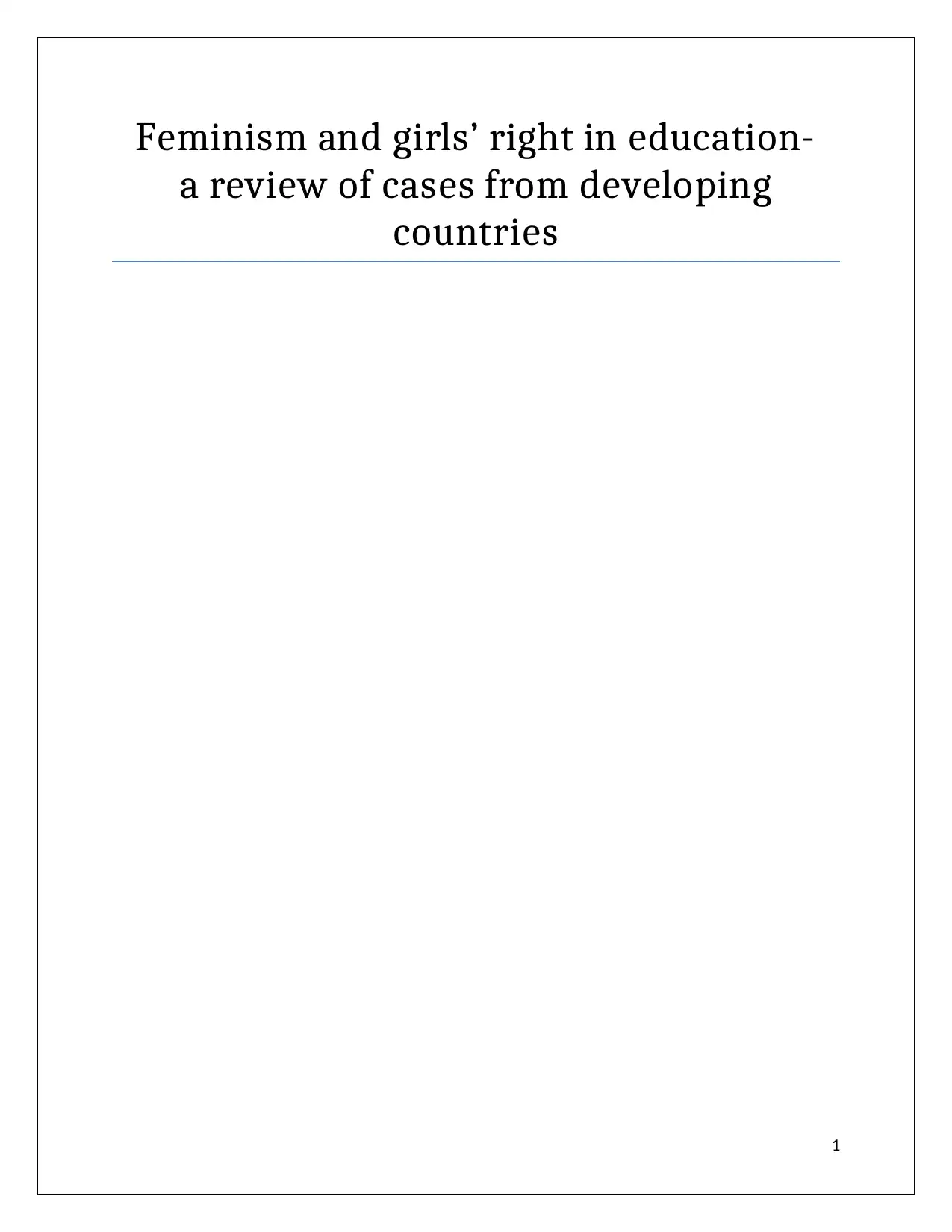
Feminism and girls’ right in education-
a review of cases from developing
countries
1
a review of cases from developing
countries
1
Paraphrase This Document
Need a fresh take? Get an instant paraphrase of this document with our AI Paraphraser
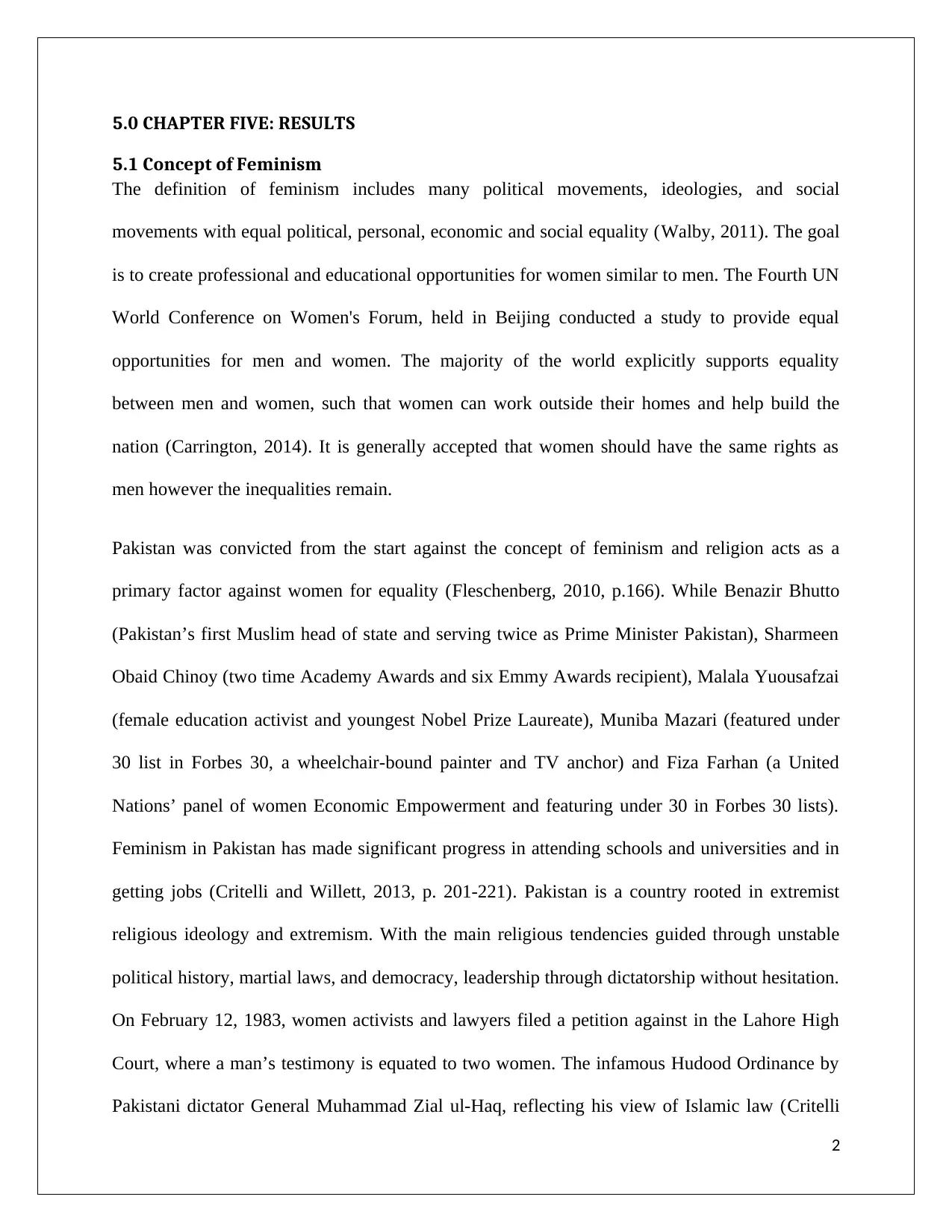
5.0 CHAPTER FIVE: RESULTS
5.1 Concept of Feminism
The definition of feminism includes many political movements, ideologies, and social
movements with equal political, personal, economic and social equality (Walby, 2011). The goal
is to create professional and educational opportunities for women similar to men. The Fourth UN
World Conference on Women's Forum, held in Beijing conducted a study to provide equal
opportunities for men and women. The majority of the world explicitly supports equality
between men and women, such that women can work outside their homes and help build the
nation (Carrington, 2014). It is generally accepted that women should have the same rights as
men however the inequalities remain.
Pakistan was convicted from the start against the concept of feminism and religion acts as a
primary factor against women for equality (Fleschenberg, 2010, p.166). While Benazir Bhutto
(Pakistan’s first Muslim head of state and serving twice as Prime Minister Pakistan), Sharmeen
Obaid Chinoy (two time Academy Awards and six Emmy Awards recipient), Malala Yuousafzai
(female education activist and youngest Nobel Prize Laureate), Muniba Mazari (featured under
30 list in Forbes 30, a wheelchair-bound painter and TV anchor) and Fiza Farhan (a United
Nations’ panel of women Economic Empowerment and featuring under 30 in Forbes 30 lists).
Feminism in Pakistan has made significant progress in attending schools and universities and in
getting jobs (Critelli and Willett, 2013, p. 201-221). Pakistan is a country rooted in extremist
religious ideology and extremism. With the main religious tendencies guided through unstable
political history, martial laws, and democracy, leadership through dictatorship without hesitation.
On February 12, 1983, women activists and lawyers filed a petition against in the Lahore High
Court, where a man’s testimony is equated to two women. The infamous Hudood Ordinance by
Pakistani dictator General Muhammad Zial ul-Haq, reflecting his view of Islamic law (Critelli
2
5.1 Concept of Feminism
The definition of feminism includes many political movements, ideologies, and social
movements with equal political, personal, economic and social equality (Walby, 2011). The goal
is to create professional and educational opportunities for women similar to men. The Fourth UN
World Conference on Women's Forum, held in Beijing conducted a study to provide equal
opportunities for men and women. The majority of the world explicitly supports equality
between men and women, such that women can work outside their homes and help build the
nation (Carrington, 2014). It is generally accepted that women should have the same rights as
men however the inequalities remain.
Pakistan was convicted from the start against the concept of feminism and religion acts as a
primary factor against women for equality (Fleschenberg, 2010, p.166). While Benazir Bhutto
(Pakistan’s first Muslim head of state and serving twice as Prime Minister Pakistan), Sharmeen
Obaid Chinoy (two time Academy Awards and six Emmy Awards recipient), Malala Yuousafzai
(female education activist and youngest Nobel Prize Laureate), Muniba Mazari (featured under
30 list in Forbes 30, a wheelchair-bound painter and TV anchor) and Fiza Farhan (a United
Nations’ panel of women Economic Empowerment and featuring under 30 in Forbes 30 lists).
Feminism in Pakistan has made significant progress in attending schools and universities and in
getting jobs (Critelli and Willett, 2013, p. 201-221). Pakistan is a country rooted in extremist
religious ideology and extremism. With the main religious tendencies guided through unstable
political history, martial laws, and democracy, leadership through dictatorship without hesitation.
On February 12, 1983, women activists and lawyers filed a petition against in the Lahore High
Court, where a man’s testimony is equated to two women. The infamous Hudood Ordinance by
Pakistani dictator General Muhammad Zial ul-Haq, reflecting his view of Islamic law (Critelli
2

and Willett, 2010, p. 407-422). Although Hudood's laws of adultery and rape have replaced by
the less pronounced Pakistani's Protection of Women Act (2006) on the protection of women in
Pakistan, however Pakistani feminists activists still have a long way to go (Shaheed, 2010).
Gender-based violence, widespread recognition of women not to seek education or employment
and communities that accept female roles as property and in domestic works remain widespread
across the country. Pakistani law, their society or religion does not allow for women to be treated
as an equal with men. Deep-rooted cultural and patriarchal traditions of Islam meets the demands
of the misogynists. Pakistan had been placed at the last point before equality, in the gender
equality annual report (Jamal, 2013). The World Economic Forum Gender Index, based in
Geneva, depicts Pakistan being on 141 lists out of 142 countries in female political participation
and economic opportunities for women, 132 in providing access to education, 119 for survival
and 85th for empowering politically.
The position of feminism in Nigeria can be analyzed from its history of feminism. The liberation
of women is part of Nigerian history and began in 1914 when several demonstrators were called
"Ogidi Palaver." The first movement was disseminated indigenous peoples and the British
(Badran, 2013). The 1925 Nwaobiala Movement was strongly reflected in the rejection of the
colonial state. It was regarded as "Women's War" involving 10,000 women who participated and
upheld the mainstream of women. In Nigeria, there have been some feminist movements with
creative expression. Feminism is absent in all walks of life, and farmers make up 40 percent of
the population (Haussman, Sawer and Vickers, 2010). Gender diversity can resolve many of the
problems that can aid the growing population with cheap and nutritious livelihoods and food.
Religion and tradition are means used by society to misinterpret women. Technology has played
an important role in modern Nigerian feminism in spreading the feminist consciousness of
3
the less pronounced Pakistani's Protection of Women Act (2006) on the protection of women in
Pakistan, however Pakistani feminists activists still have a long way to go (Shaheed, 2010).
Gender-based violence, widespread recognition of women not to seek education or employment
and communities that accept female roles as property and in domestic works remain widespread
across the country. Pakistani law, their society or religion does not allow for women to be treated
as an equal with men. Deep-rooted cultural and patriarchal traditions of Islam meets the demands
of the misogynists. Pakistan had been placed at the last point before equality, in the gender
equality annual report (Jamal, 2013). The World Economic Forum Gender Index, based in
Geneva, depicts Pakistan being on 141 lists out of 142 countries in female political participation
and economic opportunities for women, 132 in providing access to education, 119 for survival
and 85th for empowering politically.
The position of feminism in Nigeria can be analyzed from its history of feminism. The liberation
of women is part of Nigerian history and began in 1914 when several demonstrators were called
"Ogidi Palaver." The first movement was disseminated indigenous peoples and the British
(Badran, 2013). The 1925 Nwaobiala Movement was strongly reflected in the rejection of the
colonial state. It was regarded as "Women's War" involving 10,000 women who participated and
upheld the mainstream of women. In Nigeria, there have been some feminist movements with
creative expression. Feminism is absent in all walks of life, and farmers make up 40 percent of
the population (Haussman, Sawer and Vickers, 2010). Gender diversity can resolve many of the
problems that can aid the growing population with cheap and nutritious livelihoods and food.
Religion and tradition are means used by society to misinterpret women. Technology has played
an important role in modern Nigerian feminism in spreading the feminist consciousness of
3
⊘ This is a preview!⊘
Do you want full access?
Subscribe today to unlock all pages.

Trusted by 1+ million students worldwide
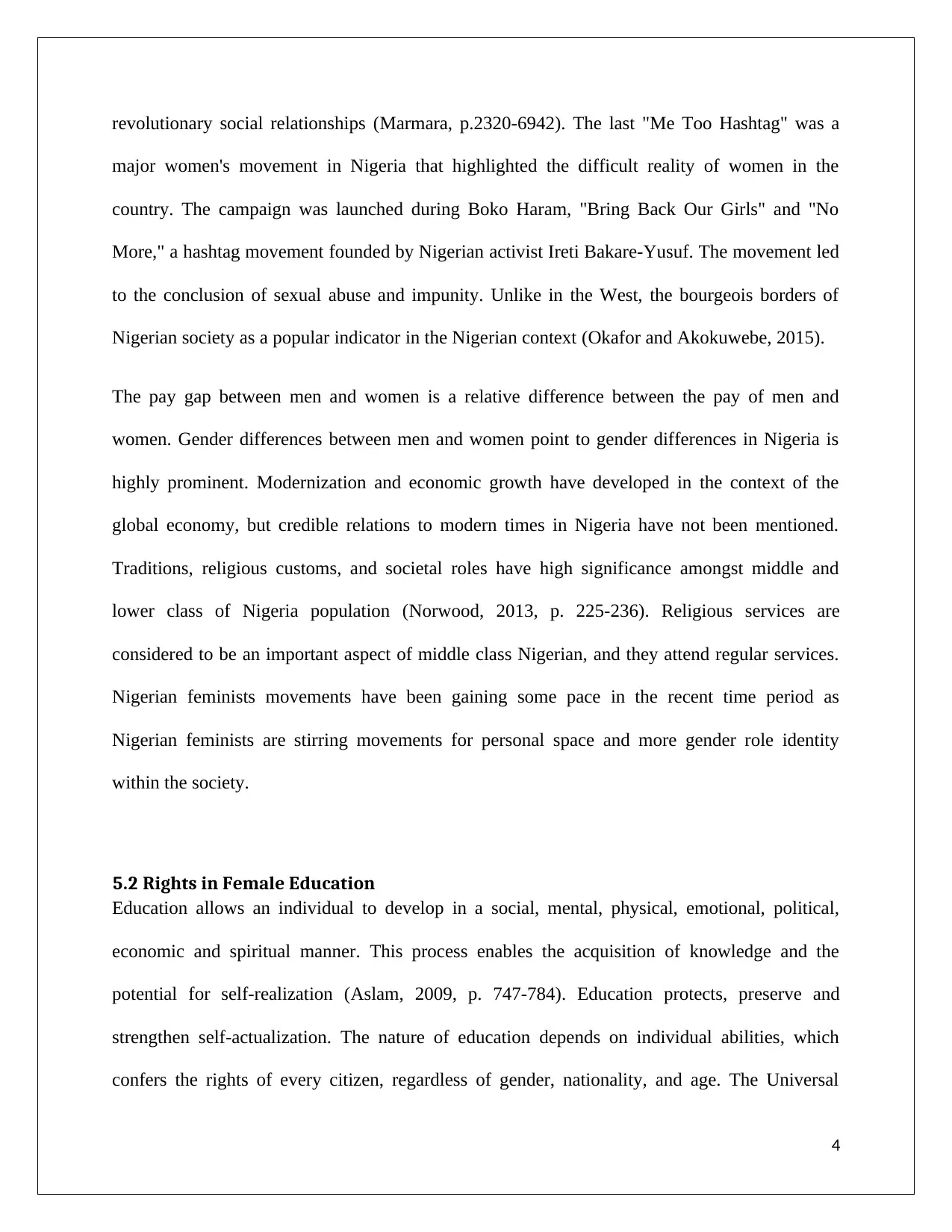
revolutionary social relationships (Marmara, p.2320-6942). The last "Me Too Hashtag" was a
major women's movement in Nigeria that highlighted the difficult reality of women in the
country. The campaign was launched during Boko Haram, "Bring Back Our Girls" and "No
More," a hashtag movement founded by Nigerian activist Ireti Bakare-Yusuf. The movement led
to the conclusion of sexual abuse and impunity. Unlike in the West, the bourgeois borders of
Nigerian society as a popular indicator in the Nigerian context (Okafor and Akokuwebe, 2015).
The pay gap between men and women is a relative difference between the pay of men and
women. Gender differences between men and women point to gender differences in Nigeria is
highly prominent. Modernization and economic growth have developed in the context of the
global economy, but credible relations to modern times in Nigeria have not been mentioned.
Traditions, religious customs, and societal roles have high significance amongst middle and
lower class of Nigeria population (Norwood, 2013, p. 225-236). Religious services are
considered to be an important aspect of middle class Nigerian, and they attend regular services.
Nigerian feminists movements have been gaining some pace in the recent time period as
Nigerian feminists are stirring movements for personal space and more gender role identity
within the society.
5.2 Rights in Female Education
Education allows an individual to develop in a social, mental, physical, emotional, political,
economic and spiritual manner. This process enables the acquisition of knowledge and the
potential for self-realization (Aslam, 2009, p. 747-784). Education protects, preserve and
strengthen self-actualization. The nature of education depends on individual abilities, which
confers the rights of every citizen, regardless of gender, nationality, and age. The Universal
4
major women's movement in Nigeria that highlighted the difficult reality of women in the
country. The campaign was launched during Boko Haram, "Bring Back Our Girls" and "No
More," a hashtag movement founded by Nigerian activist Ireti Bakare-Yusuf. The movement led
to the conclusion of sexual abuse and impunity. Unlike in the West, the bourgeois borders of
Nigerian society as a popular indicator in the Nigerian context (Okafor and Akokuwebe, 2015).
The pay gap between men and women is a relative difference between the pay of men and
women. Gender differences between men and women point to gender differences in Nigeria is
highly prominent. Modernization and economic growth have developed in the context of the
global economy, but credible relations to modern times in Nigeria have not been mentioned.
Traditions, religious customs, and societal roles have high significance amongst middle and
lower class of Nigeria population (Norwood, 2013, p. 225-236). Religious services are
considered to be an important aspect of middle class Nigerian, and they attend regular services.
Nigerian feminists movements have been gaining some pace in the recent time period as
Nigerian feminists are stirring movements for personal space and more gender role identity
within the society.
5.2 Rights in Female Education
Education allows an individual to develop in a social, mental, physical, emotional, political,
economic and spiritual manner. This process enables the acquisition of knowledge and the
potential for self-realization (Aslam, 2009, p. 747-784). Education protects, preserve and
strengthen self-actualization. The nature of education depends on individual abilities, which
confers the rights of every citizen, regardless of gender, nationality, and age. The Universal
4
Paraphrase This Document
Need a fresh take? Get an instant paraphrase of this document with our AI Paraphraser
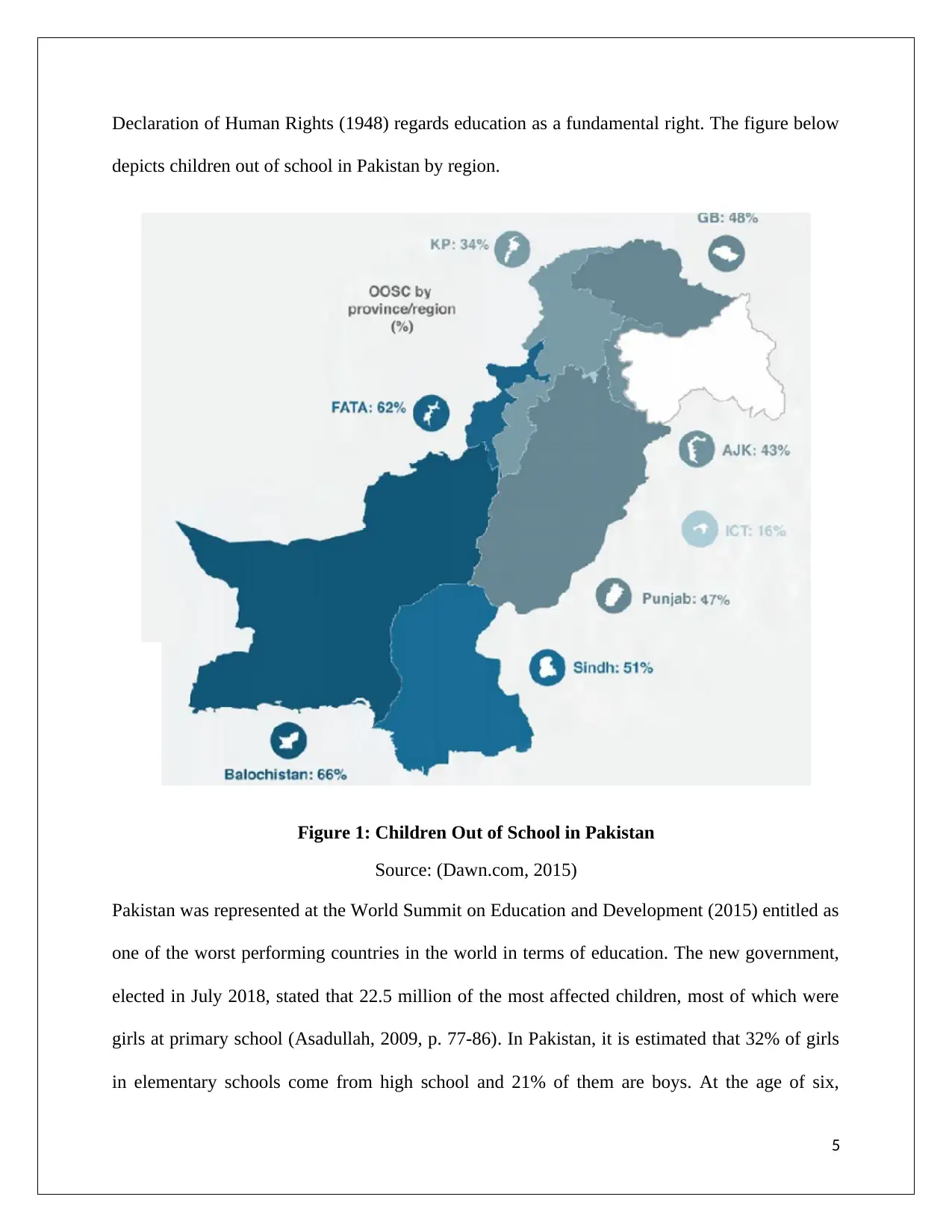
Declaration of Human Rights (1948) regards education as a fundamental right. The figure below
depicts children out of school in Pakistan by region.
Figure 1: Children Out of School in Pakistan
Source: (Dawn.com, 2015)
Pakistan was represented at the World Summit on Education and Development (2015) entitled as
one of the worst performing countries in the world in terms of education. The new government,
elected in July 2018, stated that 22.5 million of the most affected children, most of which were
girls at primary school (Asadullah, 2009, p. 77-86). In Pakistan, it is estimated that 32% of girls
in elementary schools come from high school and 21% of them are boys. At the age of six,
5
depicts children out of school in Pakistan by region.
Figure 1: Children Out of School in Pakistan
Source: (Dawn.com, 2015)
Pakistan was represented at the World Summit on Education and Development (2015) entitled as
one of the worst performing countries in the world in terms of education. The new government,
elected in July 2018, stated that 22.5 million of the most affected children, most of which were
girls at primary school (Asadullah, 2009, p. 77-86). In Pakistan, it is estimated that 32% of girls
in elementary schools come from high school and 21% of them are boys. At the age of six,
5
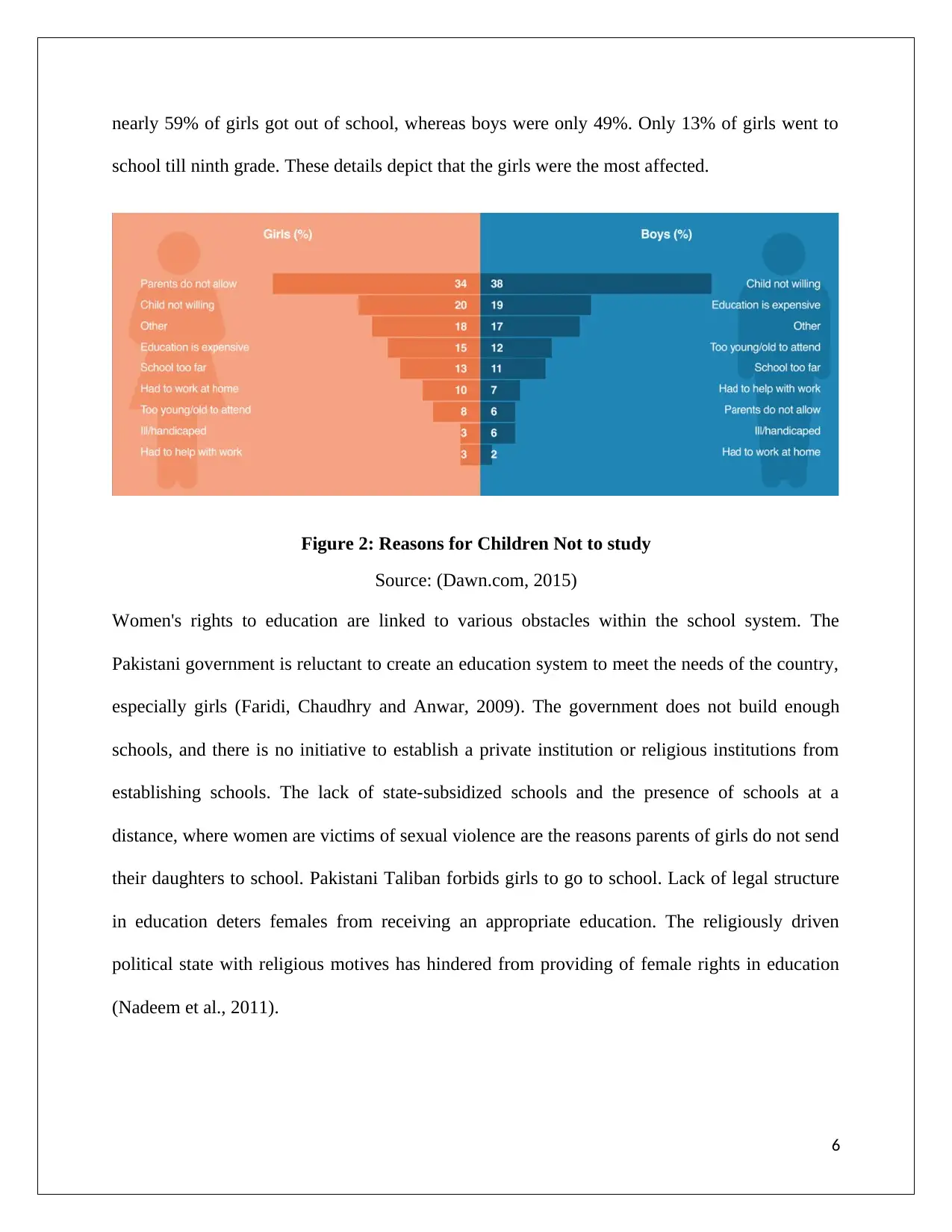
nearly 59% of girls got out of school, whereas boys were only 49%. Only 13% of girls went to
school till ninth grade. These details depict that the girls were the most affected.
Figure 2: Reasons for Children Not to study
Source: (Dawn.com, 2015)
Women's rights to education are linked to various obstacles within the school system. The
Pakistani government is reluctant to create an education system to meet the needs of the country,
especially girls (Faridi, Chaudhry and Anwar, 2009). The government does not build enough
schools, and there is no initiative to establish a private institution or religious institutions from
establishing schools. The lack of state-subsidized schools and the presence of schools at a
distance, where women are victims of sexual violence are the reasons parents of girls do not send
their daughters to school. Pakistani Taliban forbids girls to go to school. Lack of legal structure
in education deters females from receiving an appropriate education. The religiously driven
political state with religious motives has hindered from providing of female rights in education
(Nadeem et al., 2011).
6
school till ninth grade. These details depict that the girls were the most affected.
Figure 2: Reasons for Children Not to study
Source: (Dawn.com, 2015)
Women's rights to education are linked to various obstacles within the school system. The
Pakistani government is reluctant to create an education system to meet the needs of the country,
especially girls (Faridi, Chaudhry and Anwar, 2009). The government does not build enough
schools, and there is no initiative to establish a private institution or religious institutions from
establishing schools. The lack of state-subsidized schools and the presence of schools at a
distance, where women are victims of sexual violence are the reasons parents of girls do not send
their daughters to school. Pakistani Taliban forbids girls to go to school. Lack of legal structure
in education deters females from receiving an appropriate education. The religiously driven
political state with religious motives has hindered from providing of female rights in education
(Nadeem et al., 2011).
6
⊘ This is a preview!⊘
Do you want full access?
Subscribe today to unlock all pages.

Trusted by 1+ million students worldwide
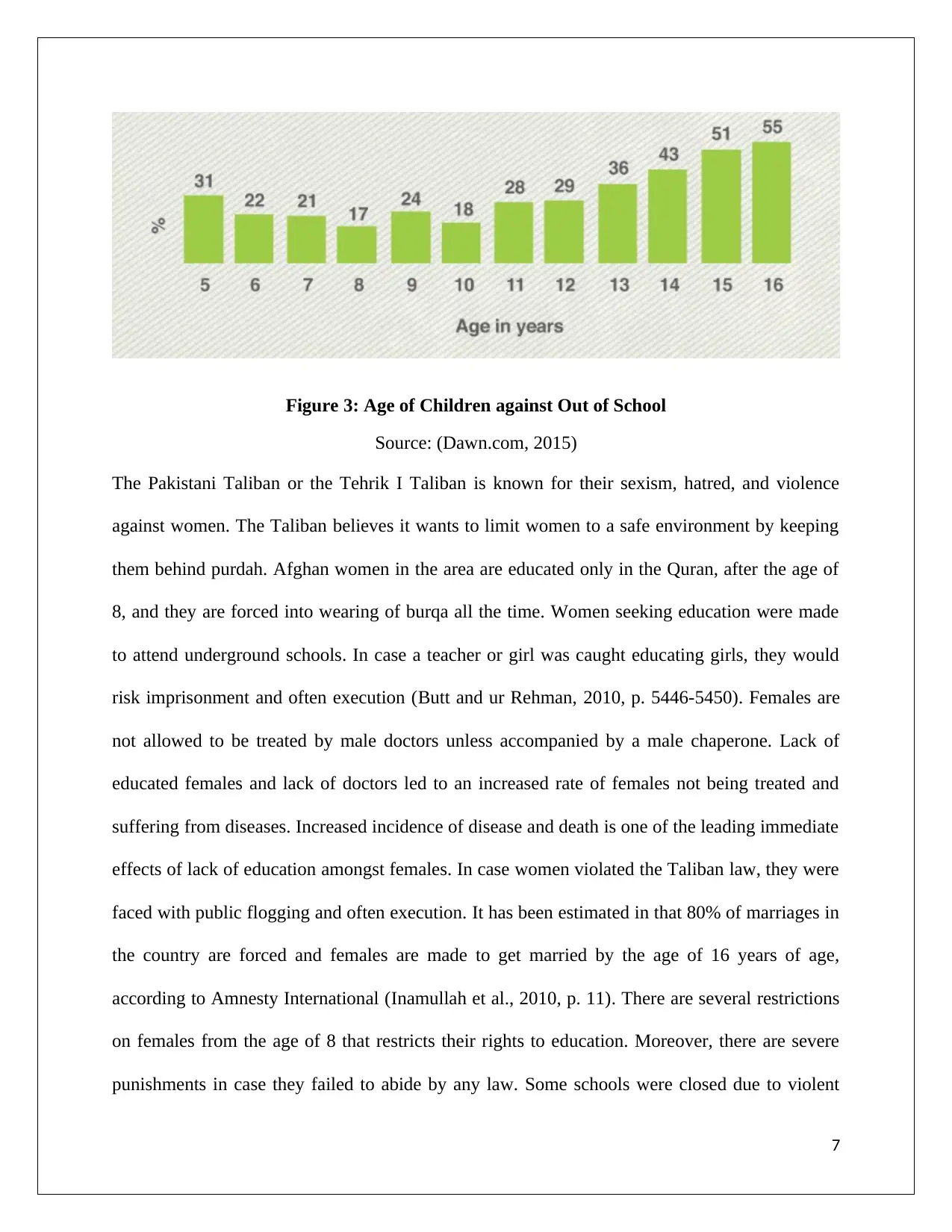
Figure 3: Age of Children against Out of School
Source: (Dawn.com, 2015)
The Pakistani Taliban or the Tehrik I Taliban is known for their sexism, hatred, and violence
against women. The Taliban believes it wants to limit women to a safe environment by keeping
them behind purdah. Afghan women in the area are educated only in the Quran, after the age of
8, and they are forced into wearing of burqa all the time. Women seeking education were made
to attend underground schools. In case a teacher or girl was caught educating girls, they would
risk imprisonment and often execution (Butt and ur Rehman, 2010, p. 5446-5450). Females are
not allowed to be treated by male doctors unless accompanied by a male chaperone. Lack of
educated females and lack of doctors led to an increased rate of females not being treated and
suffering from diseases. Increased incidence of disease and death is one of the leading immediate
effects of lack of education amongst females. In case women violated the Taliban law, they were
faced with public flogging and often execution. It has been estimated in that 80% of marriages in
the country are forced and females are made to get married by the age of 16 years of age,
according to Amnesty International (Inamullah et al., 2010, p. 11). There are several restrictions
on females from the age of 8 that restricts their rights to education. Moreover, there are severe
punishments in case they failed to abide by any law. Some schools were closed due to violent
7
Source: (Dawn.com, 2015)
The Pakistani Taliban or the Tehrik I Taliban is known for their sexism, hatred, and violence
against women. The Taliban believes it wants to limit women to a safe environment by keeping
them behind purdah. Afghan women in the area are educated only in the Quran, after the age of
8, and they are forced into wearing of burqa all the time. Women seeking education were made
to attend underground schools. In case a teacher or girl was caught educating girls, they would
risk imprisonment and often execution (Butt and ur Rehman, 2010, p. 5446-5450). Females are
not allowed to be treated by male doctors unless accompanied by a male chaperone. Lack of
educated females and lack of doctors led to an increased rate of females not being treated and
suffering from diseases. Increased incidence of disease and death is one of the leading immediate
effects of lack of education amongst females. In case women violated the Taliban law, they were
faced with public flogging and often execution. It has been estimated in that 80% of marriages in
the country are forced and females are made to get married by the age of 16 years of age,
according to Amnesty International (Inamullah et al., 2010, p. 11). There are several restrictions
on females from the age of 8 that restricts their rights to education. Moreover, there are severe
punishments in case they failed to abide by any law. Some schools were closed due to violent
7
Paraphrase This Document
Need a fresh take? Get an instant paraphrase of this document with our AI Paraphraser
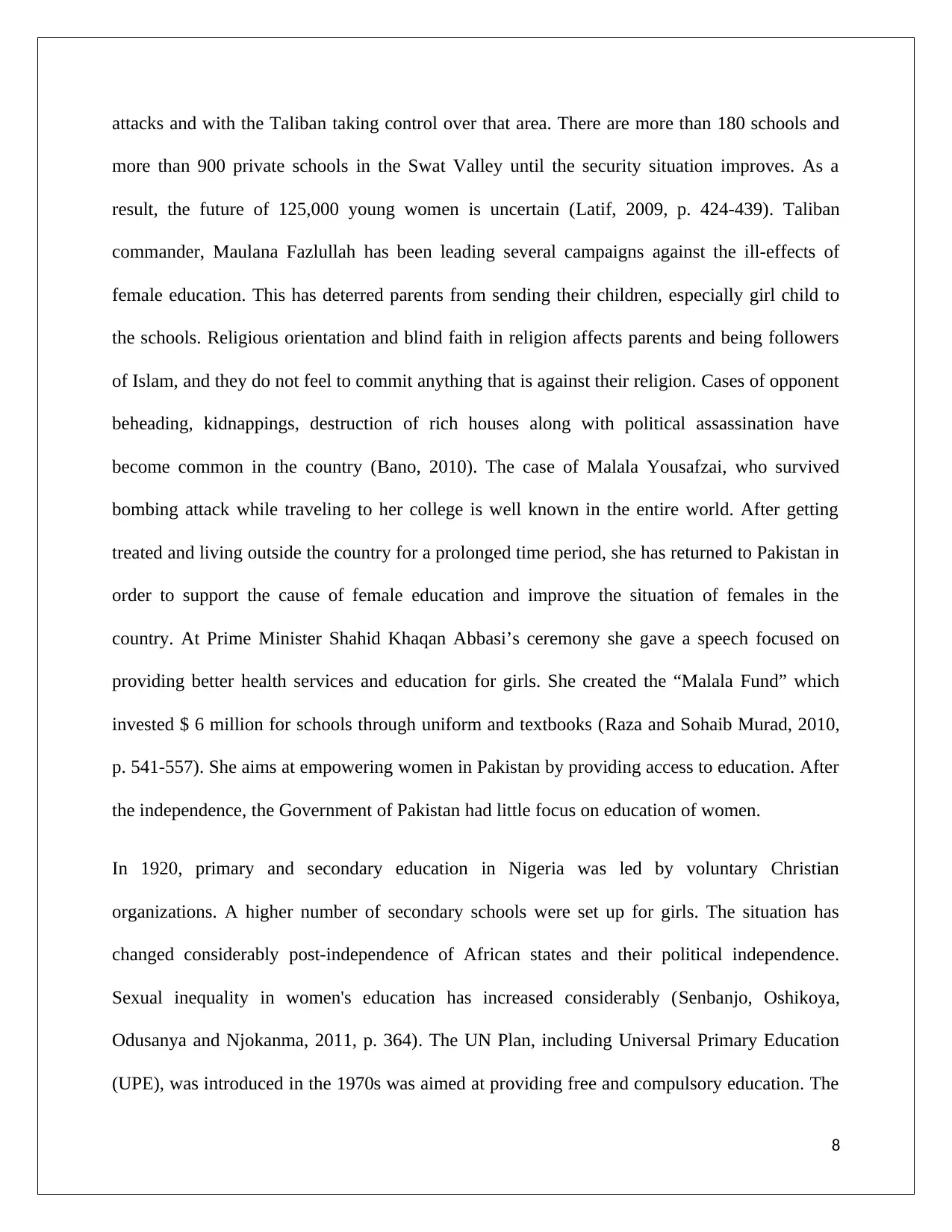
attacks and with the Taliban taking control over that area. There are more than 180 schools and
more than 900 private schools in the Swat Valley until the security situation improves. As a
result, the future of 125,000 young women is uncertain (Latif, 2009, p. 424-439). Taliban
commander, Maulana Fazlullah has been leading several campaigns against the ill-effects of
female education. This has deterred parents from sending their children, especially girl child to
the schools. Religious orientation and blind faith in religion affects parents and being followers
of Islam, and they do not feel to commit anything that is against their religion. Cases of opponent
beheading, kidnappings, destruction of rich houses along with political assassination have
become common in the country (Bano, 2010). The case of Malala Yousafzai, who survived
bombing attack while traveling to her college is well known in the entire world. After getting
treated and living outside the country for a prolonged time period, she has returned to Pakistan in
order to support the cause of female education and improve the situation of females in the
country. At Prime Minister Shahid Khaqan Abbasi’s ceremony she gave a speech focused on
providing better health services and education for girls. She created the “Malala Fund” which
invested $ 6 million for schools through uniform and textbooks (Raza and Sohaib Murad, 2010,
p. 541-557). She aims at empowering women in Pakistan by providing access to education. After
the independence, the Government of Pakistan had little focus on education of women.
In 1920, primary and secondary education in Nigeria was led by voluntary Christian
organizations. A higher number of secondary schools were set up for girls. The situation has
changed considerably post-independence of African states and their political independence.
Sexual inequality in women's education has increased considerably (Senbanjo, Oshikoya,
Odusanya and Njokanma, 2011, p. 364). The UN Plan, including Universal Primary Education
(UPE), was introduced in the 1970s was aimed at providing free and compulsory education. The
8
more than 900 private schools in the Swat Valley until the security situation improves. As a
result, the future of 125,000 young women is uncertain (Latif, 2009, p. 424-439). Taliban
commander, Maulana Fazlullah has been leading several campaigns against the ill-effects of
female education. This has deterred parents from sending their children, especially girl child to
the schools. Religious orientation and blind faith in religion affects parents and being followers
of Islam, and they do not feel to commit anything that is against their religion. Cases of opponent
beheading, kidnappings, destruction of rich houses along with political assassination have
become common in the country (Bano, 2010). The case of Malala Yousafzai, who survived
bombing attack while traveling to her college is well known in the entire world. After getting
treated and living outside the country for a prolonged time period, she has returned to Pakistan in
order to support the cause of female education and improve the situation of females in the
country. At Prime Minister Shahid Khaqan Abbasi’s ceremony she gave a speech focused on
providing better health services and education for girls. She created the “Malala Fund” which
invested $ 6 million for schools through uniform and textbooks (Raza and Sohaib Murad, 2010,
p. 541-557). She aims at empowering women in Pakistan by providing access to education. After
the independence, the Government of Pakistan had little focus on education of women.
In 1920, primary and secondary education in Nigeria was led by voluntary Christian
organizations. A higher number of secondary schools were set up for girls. The situation has
changed considerably post-independence of African states and their political independence.
Sexual inequality in women's education has increased considerably (Senbanjo, Oshikoya,
Odusanya and Njokanma, 2011, p. 364). The UN Plan, including Universal Primary Education
(UPE), was introduced in the 1970s was aimed at providing free and compulsory education. The
8

Nigerian historian Kitetu said that domestic traditional philosophy is aimed at women in making
domestic contributions only. The situation changed with public awareness, state intervention,
parents and their girls being sent to school. This has brought about more women involvement.
Women in school have increased since 1990, but the boys have been ever since more compared
to girls. Between 1970 and 1994, the number of primary school students increased from 30% to
80% (Isara and Ojedokun, 2011).
Figure 4: Percentage of Girls in Education
Source: (Hatch, 2011)
Over the last decade, many discussions have focused on sexual inequality in Nigeria. Adult
female literacy has yet to be successful; lack of literacy can be attributed to lack of schools at
every location, absence of security in girls, lack of hygiene elements. There are several important
factors seen in the gender differences, but the new rise in Boko Haram led to the black people
leaving their homes and fleeing for their lives. Boko Haram kidnapped girls from their schools
and rapid them. The girls had been in hostages for a long time until Boko Haram decided to
9
domestic contributions only. The situation changed with public awareness, state intervention,
parents and their girls being sent to school. This has brought about more women involvement.
Women in school have increased since 1990, but the boys have been ever since more compared
to girls. Between 1970 and 1994, the number of primary school students increased from 30% to
80% (Isara and Ojedokun, 2011).
Figure 4: Percentage of Girls in Education
Source: (Hatch, 2011)
Over the last decade, many discussions have focused on sexual inequality in Nigeria. Adult
female literacy has yet to be successful; lack of literacy can be attributed to lack of schools at
every location, absence of security in girls, lack of hygiene elements. There are several important
factors seen in the gender differences, but the new rise in Boko Haram led to the black people
leaving their homes and fleeing for their lives. Boko Haram kidnapped girls from their schools
and rapid them. The girls had been in hostages for a long time until Boko Haram decided to
9
⊘ This is a preview!⊘
Do you want full access?
Subscribe today to unlock all pages.

Trusted by 1+ million students worldwide

release them (Ekpenyong, Davis, Akpan and Daniel, 2011, p. 193). This event shook the whole
nation, and after that, it caused a serious drop in schools enrolment because parents were afraid
their daughters would not be kidnapped. Parents of girls from the Nigerian culture marry them
off young. Examples of sexual violence, sexual persecution, and school threats are other factors
that prevent women's education.
5.3 Perception of Cultural, Roles of Gender and Religion
Cultural perception, gender, and religion are considered to be the major deterrent in Nigeria and
Pakistan, which have been snatching away female rights to education and binding them
household chores. In Pakistan, Malala Yousafzai, recipient of Nobel Peace Prize 2014, is
struggling to provide the right to education for women (Chatta and Ayub, 2010, p. 1-8). Pakistani
gunmen attempted to kill her in her homeland in 2012 because she was fighting development,
religion, modernization. Pakistani women, because of their cultural beliefs, gender and religion,
health systems, education systems, and political systems are themselves against formal
education. They face demotivations within their family against a system of formal education and
they are more reliant on Quran education. The forced norms within their community coerce them
to receive a ma’s decisions for all aspect of their lives. Extremism in religion is responsible for
reducing the social role of women and reduced women rights. Pakistan is a patriarchal
community where men have official authority and women are considered for domestic duties.
Such a cultural and social tradition has grave consequences for the vision of women's lives.
Religious essences and traditional cultural boundaries hinder women's right to education. The
situation is more or less similar in Nigeria. Sexuality is a social identity that is integrated into the
social and personal realm of social construction. The spread of masculinity and religion control
between Muslims and Christians has resulted in less empowerment of women and fewer
10
nation, and after that, it caused a serious drop in schools enrolment because parents were afraid
their daughters would not be kidnapped. Parents of girls from the Nigerian culture marry them
off young. Examples of sexual violence, sexual persecution, and school threats are other factors
that prevent women's education.
5.3 Perception of Cultural, Roles of Gender and Religion
Cultural perception, gender, and religion are considered to be the major deterrent in Nigeria and
Pakistan, which have been snatching away female rights to education and binding them
household chores. In Pakistan, Malala Yousafzai, recipient of Nobel Peace Prize 2014, is
struggling to provide the right to education for women (Chatta and Ayub, 2010, p. 1-8). Pakistani
gunmen attempted to kill her in her homeland in 2012 because she was fighting development,
religion, modernization. Pakistani women, because of their cultural beliefs, gender and religion,
health systems, education systems, and political systems are themselves against formal
education. They face demotivations within their family against a system of formal education and
they are more reliant on Quran education. The forced norms within their community coerce them
to receive a ma’s decisions for all aspect of their lives. Extremism in religion is responsible for
reducing the social role of women and reduced women rights. Pakistan is a patriarchal
community where men have official authority and women are considered for domestic duties.
Such a cultural and social tradition has grave consequences for the vision of women's lives.
Religious essences and traditional cultural boundaries hinder women's right to education. The
situation is more or less similar in Nigeria. Sexuality is a social identity that is integrated into the
social and personal realm of social construction. The spread of masculinity and religion control
between Muslims and Christians has resulted in less empowerment of women and fewer
10
Paraphrase This Document
Need a fresh take? Get an instant paraphrase of this document with our AI Paraphraser
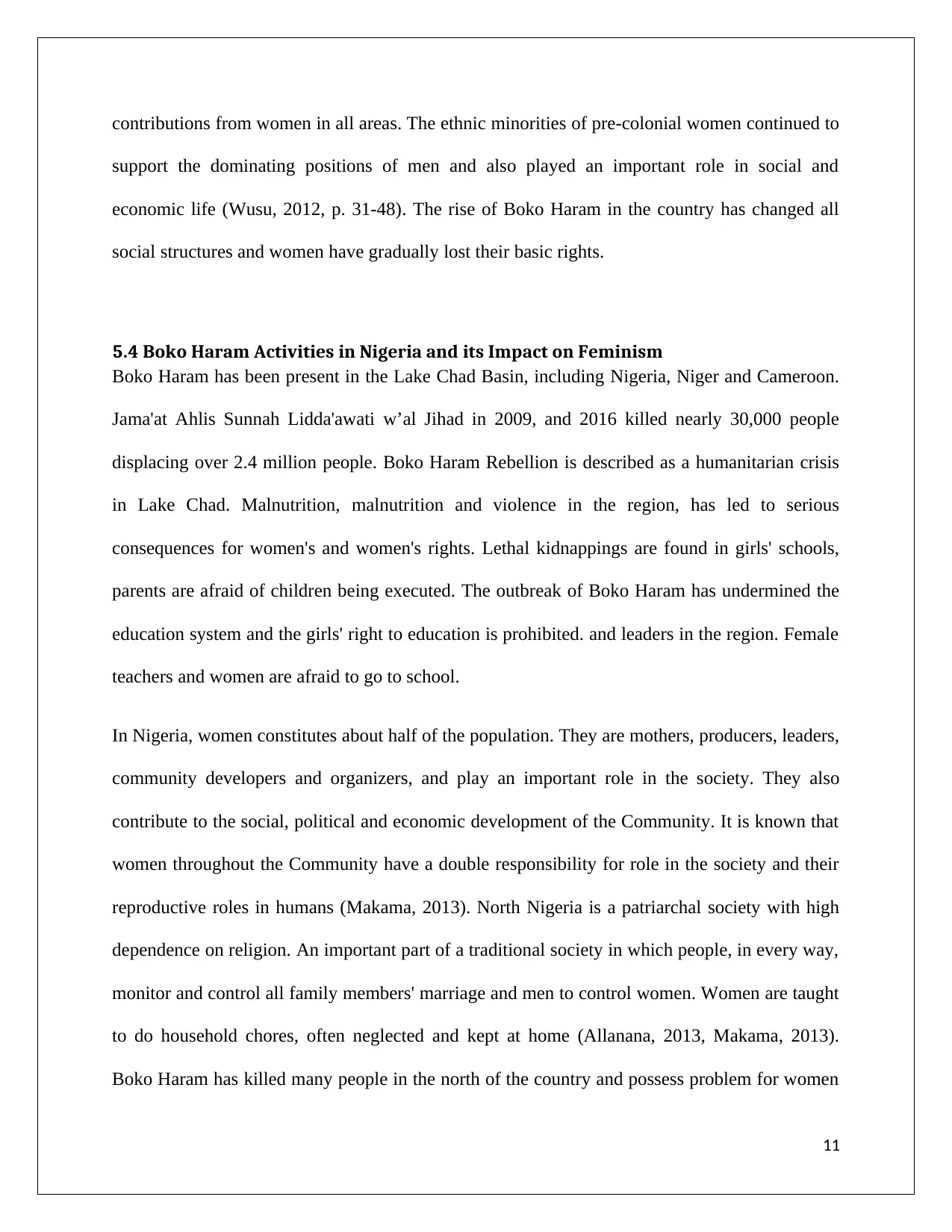
contributions from women in all areas. The ethnic minorities of pre-colonial women continued to
support the dominating positions of men and also played an important role in social and
economic life (Wusu, 2012, p. 31-48). The rise of Boko Haram in the country has changed all
social structures and women have gradually lost their basic rights.
5.4 Boko Haram Activities in Nigeria and its Impact on Feminism
Boko Haram has been present in the Lake Chad Basin, including Nigeria, Niger and Cameroon.
Jama'at Ahlis Sunnah Lidda'awati w’al Jihad in 2009, and 2016 killed nearly 30,000 people
displacing over 2.4 million people. Boko Haram Rebellion is described as a humanitarian crisis
in Lake Chad. Malnutrition, malnutrition and violence in the region, has led to serious
consequences for women's and women's rights. Lethal kidnappings are found in girls' schools,
parents are afraid of children being executed. The outbreak of Boko Haram has undermined the
education system and the girls' right to education is prohibited. and leaders in the region. Female
teachers and women are afraid to go to school.
In Nigeria, women constitutes about half of the population. They are mothers, producers, leaders,
community developers and organizers, and play an important role in the society. They also
contribute to the social, political and economic development of the Community. It is known that
women throughout the Community have a double responsibility for role in the society and their
reproductive roles in humans (Makama, 2013). North Nigeria is a patriarchal society with high
dependence on religion. An important part of a traditional society in which people, in every way,
monitor and control all family members' marriage and men to control women. Women are taught
to do household chores, often neglected and kept at home (Allanana, 2013, Makama, 2013).
Boko Haram has killed many people in the north of the country and possess problem for women
11
support the dominating positions of men and also played an important role in social and
economic life (Wusu, 2012, p. 31-48). The rise of Boko Haram in the country has changed all
social structures and women have gradually lost their basic rights.
5.4 Boko Haram Activities in Nigeria and its Impact on Feminism
Boko Haram has been present in the Lake Chad Basin, including Nigeria, Niger and Cameroon.
Jama'at Ahlis Sunnah Lidda'awati w’al Jihad in 2009, and 2016 killed nearly 30,000 people
displacing over 2.4 million people. Boko Haram Rebellion is described as a humanitarian crisis
in Lake Chad. Malnutrition, malnutrition and violence in the region, has led to serious
consequences for women's and women's rights. Lethal kidnappings are found in girls' schools,
parents are afraid of children being executed. The outbreak of Boko Haram has undermined the
education system and the girls' right to education is prohibited. and leaders in the region. Female
teachers and women are afraid to go to school.
In Nigeria, women constitutes about half of the population. They are mothers, producers, leaders,
community developers and organizers, and play an important role in the society. They also
contribute to the social, political and economic development of the Community. It is known that
women throughout the Community have a double responsibility for role in the society and their
reproductive roles in humans (Makama, 2013). North Nigeria is a patriarchal society with high
dependence on religion. An important part of a traditional society in which people, in every way,
monitor and control all family members' marriage and men to control women. Women are taught
to do household chores, often neglected and kept at home (Allanana, 2013, Makama, 2013).
Boko Haram has killed many people in the north of the country and possess problem for women
11
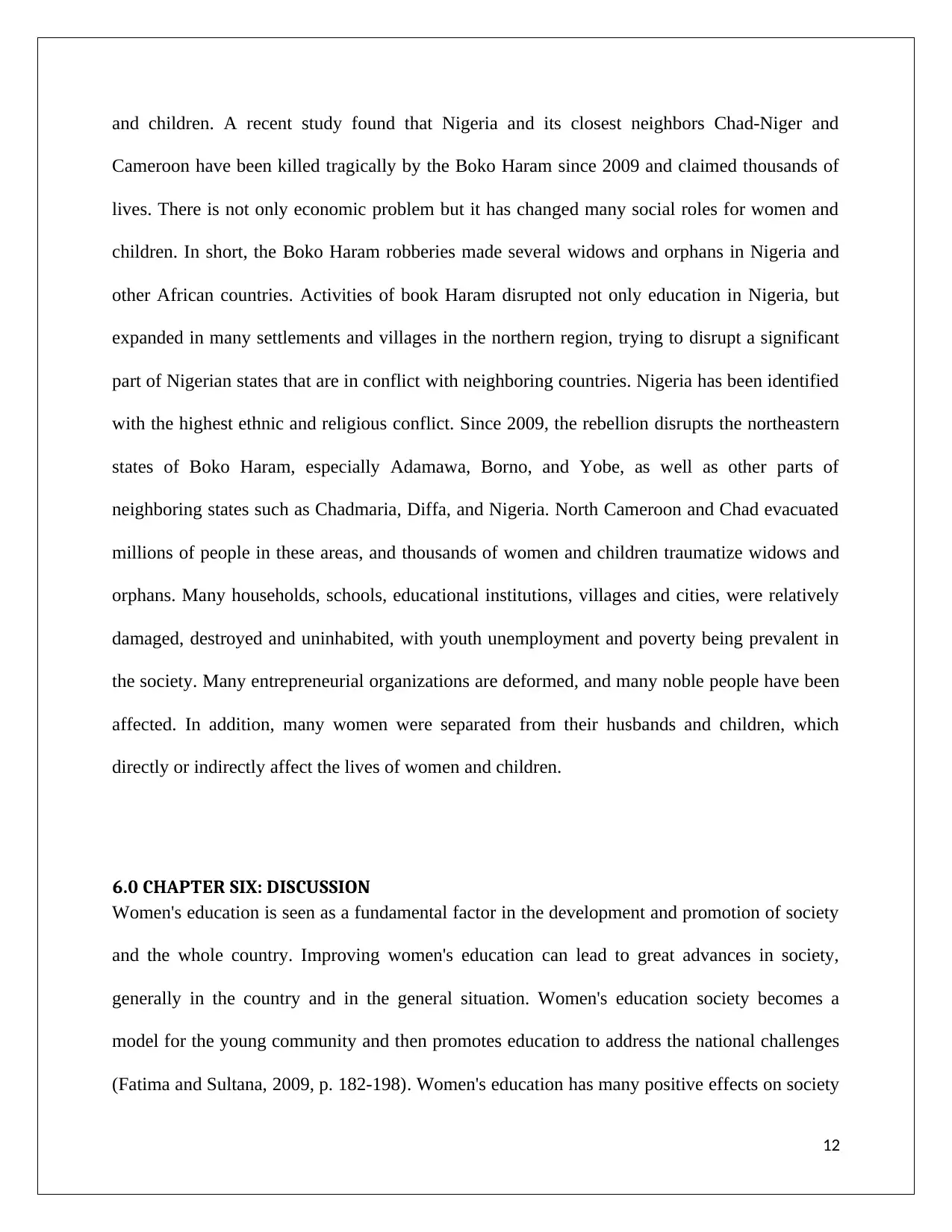
and children. A recent study found that Nigeria and its closest neighbors Chad-Niger and
Cameroon have been killed tragically by the Boko Haram since 2009 and claimed thousands of
lives. There is not only economic problem but it has changed many social roles for women and
children. In short, the Boko Haram robberies made several widows and orphans in Nigeria and
other African countries. Activities of book Haram disrupted not only education in Nigeria, but
expanded in many settlements and villages in the northern region, trying to disrupt a significant
part of Nigerian states that are in conflict with neighboring countries. Nigeria has been identified
with the highest ethnic and religious conflict. Since 2009, the rebellion disrupts the northeastern
states of Boko Haram, especially Adamawa, Borno, and Yobe, as well as other parts of
neighboring states such as Chadmaria, Diffa, and Nigeria. North Cameroon and Chad evacuated
millions of people in these areas, and thousands of women and children traumatize widows and
orphans. Many households, schools, educational institutions, villages and cities, were relatively
damaged, destroyed and uninhabited, with youth unemployment and poverty being prevalent in
the society. Many entrepreneurial organizations are deformed, and many noble people have been
affected. In addition, many women were separated from their husbands and children, which
directly or indirectly affect the lives of women and children.
6.0 CHAPTER SIX: DISCUSSION
Women's education is seen as a fundamental factor in the development and promotion of society
and the whole country. Improving women's education can lead to great advances in society,
generally in the country and in the general situation. Women's education society becomes a
model for the young community and then promotes education to address the national challenges
(Fatima and Sultana, 2009, p. 182-198). Women's education has many positive effects on society
12
Cameroon have been killed tragically by the Boko Haram since 2009 and claimed thousands of
lives. There is not only economic problem but it has changed many social roles for women and
children. In short, the Boko Haram robberies made several widows and orphans in Nigeria and
other African countries. Activities of book Haram disrupted not only education in Nigeria, but
expanded in many settlements and villages in the northern region, trying to disrupt a significant
part of Nigerian states that are in conflict with neighboring countries. Nigeria has been identified
with the highest ethnic and religious conflict. Since 2009, the rebellion disrupts the northeastern
states of Boko Haram, especially Adamawa, Borno, and Yobe, as well as other parts of
neighboring states such as Chadmaria, Diffa, and Nigeria. North Cameroon and Chad evacuated
millions of people in these areas, and thousands of women and children traumatize widows and
orphans. Many households, schools, educational institutions, villages and cities, were relatively
damaged, destroyed and uninhabited, with youth unemployment and poverty being prevalent in
the society. Many entrepreneurial organizations are deformed, and many noble people have been
affected. In addition, many women were separated from their husbands and children, which
directly or indirectly affect the lives of women and children.
6.0 CHAPTER SIX: DISCUSSION
Women's education is seen as a fundamental factor in the development and promotion of society
and the whole country. Improving women's education can lead to great advances in society,
generally in the country and in the general situation. Women's education society becomes a
model for the young community and then promotes education to address the national challenges
(Fatima and Sultana, 2009, p. 182-198). Women's education has many positive effects on society
12
⊘ This is a preview!⊘
Do you want full access?
Subscribe today to unlock all pages.

Trusted by 1+ million students worldwide
1 out of 28
Your All-in-One AI-Powered Toolkit for Academic Success.
+13062052269
info@desklib.com
Available 24*7 on WhatsApp / Email
![[object Object]](/_next/static/media/star-bottom.7253800d.svg)
Unlock your academic potential
Copyright © 2020–2026 A2Z Services. All Rights Reserved. Developed and managed by ZUCOL.


